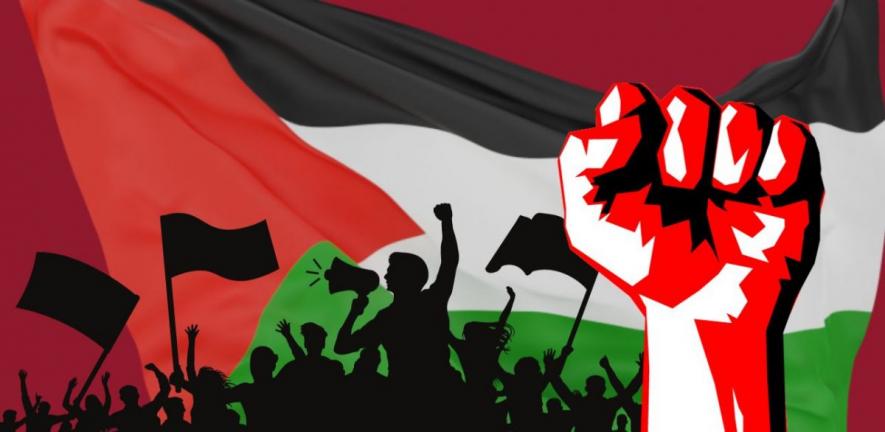Shh, Don’t Support India’s Official Position on Palestine or Sec 153A Will be Imposed on you!

Image courtesy: The Leaflet
On October 7, Hamas, a political and military organisation governing the Gaza strip of Palestinian territories, launched a violent attack on Israel, killing over 1,400 and taking hostages.
Following the violence, the Israeli government launched a retaliatory attack on Gaza. On October 9, 2023, Israel’s minister of defence announced a “complete siege” of the Gaza Strip.
Israel has dropped thousands of tons of explosives, displacing over a million, killing over 8,000 and injuring more than 25,000 Palestinians in Gaza. Israeli violence against Palestinians is ongoing.
India’s position on Israel–Palestine conflict
Historically, India has expressed its unequivocal sympathy for the cause of Palestine.
India was the first non-Arab State to recognise the Palestine Liberation Organisation as “the sole and legitimate representative of the Palestine people” in 1974. India was among the first countries to recognise the Palestine State in 1988.
India was one of the last non-Muslim states to recognise the establishment of Israel in 1950.
Prominent leaders such as Jawaharlal Nehru and Mahatma Gandhi have determinedly stood by the rights of the Arabs in Palestine.
In recent times, India has displayed a “balancing act” to the Israel–Palestine conflict.
In 2016, India abstained from voting at the United Nations on whether Israel should be persecuted by the International Criminal Court for Israel’s alleged war crimes in Gaza in 2014.
In 2017, India voted in support of a resolution opposing the US and Israel for an attempt to unilaterally declare all of Jerusalem as Israel’s capital. Palestine claims the eastern part of the ancient city of Jerusalem.
After the attacks by Hamas, the Prime Minister of India, Narendra Modi, expressed his solidarity with Israel.
On October 12, the Ministry of External Affairs (MEA) reiterated its official stand on establishing a sovereign State of Palestine.
The MEA wrote, “Our policy in this regard has been long-standing and consistent. India has always advocated the resumption of direct negotiations towards establishing a sovereign, independent and viable State of Palestine living within secure and recognised borders, side by side at peace with Israel.”
On Friday, during the United Nations General Assembly’s Tenth Emergency Special Session, a resolution that called for an immediate humanitarian truce in the Israel–Hamas conflict was adopted. Along with 45 other countries, India abstained from voting.
Pro-palestine protests
What has noticeably changed during the recent flare-up in the Israel–Palestine conflict though has been the attitude of police and administration towards public stances on the issue.
Early on during the latest flare-up, Al Jazeera published a damning report highlighting how most pro-Israel and anti-Palestine propaganda on social media was emerging from India.
Much of this traffic is coming from right-wing Hindutva lobby calling for genocide of Muslim Palestinians, fuelled by years of anti-Muslim hatred at home.
On the other hand, the Union and state governments are cracking down on voices calling for an immediate cessation of killing of civilians, provision of essentials like water, food and electricity for the two million besieged Palestinians in Gaza, and long-term peace.
Any criticism of Israel was brought under the scanner very early on.
On October 9, a first information report was lodged against four students of Aligarh Muslim University (AMU) for holding a peaceful protest within the campus, expressing support for Palestine.
The students were charged under Sections 153A (promoting enmity between two groups), 188 (disobedience to order duly promulgated by public servant) and 505 (statements conducing to public mischief) of the Indian Penal Code (IPC) for taking out protests without permission.
On October 16, over 60 people were detained for organising protests condemning Israel’s attacks on Gaza.
The Delhi police and the Rapid Action Force detained protesters, comprising student groups and human rights organisations, for not abiding by the denial of permission to hold protests.
The permission to hold protests was denied to the protestors, reportedly on security grounds.
On October 23, the Delhi police briefly detained students from Jawaharlal Nehru University, Jamia Millia Islamia and Delhi University in their attempt to hold protests near the Israeli embassy.
The police detained the protestors for not procuring the required permission, it is reported.
On October 13, Hamirpur police in Uttar Pradesh booked two Muslim clerics for supporting Palestine on social media posts.
Reportedly, the clerics have been booked under Sections 153A and 505 (2) (statements creating or promoting enmity, hatred or ill-will between classes) of the IPC.
While one cleric was arrested, the police are conducting raids to arrest the other cleric.
Uttar Pradesh Chief Minister Yogi Adityanath has directed to take action against activities that are not in line with the Union government’s position on the Israel–Palestine conflict (by expressing support for Israel and condemning attacks by Hamas).
It has been reported that the police have been asked to take “swift” and “stern” actions against those expressing support for Palestine on social media.
Senior district police officials have been directed to make it clear to Muslim clerics that “any attempt to incite passion on social media or a similar call from the religious places will not be tolerated”, Deccan Herald reported.
On October 16, a police constable in Uttar Pradesh, Suhail Ansari was suspended for expressing support for Palestine and for reportedly seeking donations for the besieged Palestinians.
On October 27, Bengaluru for Justice and Peace, a coalition of organisations and concerned citizens, wrote to the chief minister of Karnataka, Siddaramaiah Avaru, demanding the state government to uphold their right to protest for justice for the Palestinians and for calling for an immediate ceasefire in the Israel–Palestine region.
The letter was addressed in reference to the state government’s alleged efforts in “clamping down” on protests by denying permission to hold protests as well as detaining peaceful protesters gathered in solidarity with Palestine.
The state police have detained and filed first information reports (FIRs) against protesters in Bengaluru, Mysuru and Tumkur for voicing their support for Palestinians.
Citing the rejection of permission, the letter says that on October 26, the deputy commissioner of police (West Division) rejected permission to hold the protest on displaying support for Palestine in Freedom Park, a designated public park for protests.
A test case of frivolous use of Section 153A?
Rights activists have for long criticised what they term as arbitrary and disproportionate use of Section 153A of the IPC. Critics say the Section is invoked to silence dissent and political opponents of the ruling party, even while authorities turn a blind eye to blatant calls for violence and hate-filled speech by supporters of the ruling party against minority communities.
The above-mentioned pro-Palestine protestors have also been charged under Section 153A.
Section 153A of the IPC penalises enmity between different groups on grounds such as religion, race, place of birth and residence. It also penalises acts prejudicial to the maintenance of harmony.
Since the provision strives to punish those spreading disharmony and disturbing public tranquillity, it begs the question of the rationale for holding the protestors calling for a ceasefire in the Israel–Palestine region liable for creating disharmony between groups that are not based in the country.
Bengaluru for Justice and Peace has claimed the fundamental right to freedom of speech and expression, right to peaceful assembly and right to association is guaranteed under Article 19(1) of the Constitution.
Article 19(2) of the Constitution provides for certain reasonable restrictions on the exercise of the right, including friendly relations with foreign States.
The deputy commissioner of police denied permission to hold peaceful protests in expressing solidarity with Palestine. The rejection was justified on the grounds of it being an international issue and for violating law and Order.
Notably, neither of the grounds finds place under the arena of reasonable restrictions.
Considering India’s ‘balancing act’ with Israel and Palestine, another question arises on the applicability of reasonable restriction of “friendly relations with foreign States” in disallowing the protests.
Support for Israel
Reportedly, Naor Gilon, Israel’s Ambassador to India, has expressed gratitude to the Indian leaders and people for extended support to Israel.
Acknowledging the considerable support, it is reported that Gilon said there could be “another Israeli Defence Force with the Indian volunteers”.
With ‘India is with Israel’ trending on X (formerly Twitter), Israel’s Ministry of Foreign Affairs’ Digital Diplomacy team has thanked India.
An article in The Wire reports refers to dozens of WhatsApp and Facebook groups that “weaponised” the Israel–Palestine conflict to “target Muslims”.
Anguish of activists
Ramees Velom, National President of Student Islamic Organisation, which organised some of the pro-Palestine and pro-peace protests, told The Leaflet, “We strongly condemn the government’s audacity to deny permission for any peaceful protest gatherings in Delhi. They are chasing and manhandling the protesters of various gatherings. It is shameful for any democratic country, as well as for India, which has historically stood with Palestine.”
Aishe Goshe, president of Jawaharlal Nehru University Students’ Union (JNUSU), shared with The Leaflet that the JNUSU joined in solidarity with the protest called in front of the Embassy of Israel “to voice our solidarity with the people of Palestine”.
“Despite hundreds of students joining the call, the Delhi police brutally detained the students and kept them in police stations for several hours,” Ghosh added.
According to Ghosh, the initial support from the Union government towards Israel “has clearly given a direction towards what form of solidarity it stands for”.
Aishwarya Ravikumar, member of People’s Union for Civil Liberties and Bengaluru for Justice and Peace spoke with The Leaflet and said, “We have received no support from the state government in organising a peaceful protest [calling for a ceasefire in the region].”
Ravikumar termed the process of seeking permission as exceptionally “gruesome”, which is unlike seeking permission for past protests on other issues.
The right to peaceful protest and assembly forms part of the fundamental right to speech and expression, Ravikumar stressed.
Ravikumar termed the multiple rejections of permissions as “anti-democratic” that is “nothing short of a violation of constitutional rights,” amounting to “stifling of solidarity”.
Journalist-in-training Noorail Khan, who attended pro-Palestine and pro-peace protests in Delhi, told The Leaflet, “At one level it is surprising that Indians who don’t care about the pathetic condition to which their own compatriots have been reduced (through dispossession, abuse of power and violent attacks such as lynching) would care about people in a far-off land.
“But at another level it is not so surprising because the blind hatred spreading in India has already consumed their sense of history and geography.”
Sarah Thanawala is a staff writer at The Leaflet.
Get the latest reports & analysis with people's perspective on Protests, movements & deep analytical videos, discussions of the current affairs in your Telegram app. Subscribe to NewsClick's Telegram channel & get Real-Time updates on stories, as they get published on our website.






















